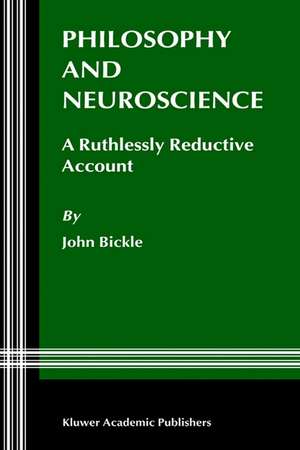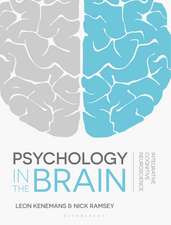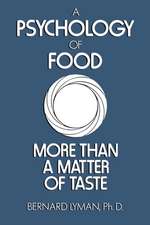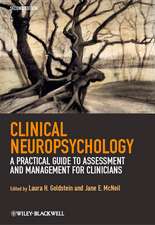Philosophy and Neuroscience: A Ruthlessly Reductive Account: Studies in Brain and Mind, cartea 2
Autor J. Bickleen Limba Engleză Hardback – 31 mai 2003
| Toate formatele și edițiile | Preț | Express |
|---|---|---|
| Paperback (1) | 698.62 lei 6-8 săpt. | |
| SPRINGER NETHERLANDS – 31 mai 2003 | 698.62 lei 6-8 săpt. | |
| Hardback (1) | 646.94 lei 6-8 săpt. | |
| SPRINGER NETHERLANDS – 31 mai 2003 | 646.94 lei 6-8 săpt. |
Din seria Studies in Brain and Mind
-
 Preț: 391.22 lei
Preț: 391.22 lei - 15%
 Preț: 645.96 lei
Preț: 645.96 lei - 15%
 Preț: 583.61 lei
Preț: 583.61 lei - 24%
 Preț: 686.51 lei
Preț: 686.51 lei - 15%
 Preț: 699.77 lei
Preț: 699.77 lei - 15%
 Preț: 707.96 lei
Preț: 707.96 lei - 15%
 Preț: 645.47 lei
Preț: 645.47 lei - 15%
 Preț: 643.99 lei
Preț: 643.99 lei -
 Preț: 390.08 lei
Preț: 390.08 lei - 20%
 Preț: 554.05 lei
Preț: 554.05 lei - 15%
 Preț: 578.05 lei
Preț: 578.05 lei - 18%
 Preț: 791.40 lei
Preț: 791.40 lei - 18%
 Preț: 777.03 lei
Preț: 777.03 lei - 15%
 Preț: 691.91 lei
Preț: 691.91 lei - 15%
 Preț: 698.80 lei
Preț: 698.80 lei - 15%
 Preț: 641.85 lei
Preț: 641.85 lei - 18%
 Preț: 1118.45 lei
Preț: 1118.45 lei - 15%
 Preț: 639.25 lei
Preț: 639.25 lei - 15%
 Preț: 662.80 lei
Preț: 662.80 lei -
 Preț: 392.21 lei
Preț: 392.21 lei -
 Preț: 394.71 lei
Preț: 394.71 lei -
 Preț: 394.51 lei
Preț: 394.51 lei
Preț: 646.94 lei
Preț vechi: 761.10 lei
-15% Nou
Puncte Express: 970
Preț estimativ în valută:
123.81€ • 128.78$ • 102.21£
123.81€ • 128.78$ • 102.21£
Carte tipărită la comandă
Livrare economică 14-28 aprilie
Preluare comenzi: 021 569.72.76
Specificații
ISBN-13: 9781402073946
ISBN-10: 1402073941
Pagini: 256
Ilustrații: XVI, 235 p.
Dimensiuni: 155 x 235 x 19 mm
Greutate: 0.6 kg
Ediția:2003
Editura: SPRINGER NETHERLANDS
Colecția Springer
Seria Studies in Brain and Mind
Locul publicării:Dordrecht, Netherlands
ISBN-10: 1402073941
Pagini: 256
Ilustrații: XVI, 235 p.
Dimensiuni: 155 x 235 x 19 mm
Greutate: 0.6 kg
Ediția:2003
Editura: SPRINGER NETHERLANDS
Colecția Springer
Seria Studies in Brain and Mind
Locul publicării:Dordrecht, Netherlands
Public țintă
ResearchCuprins
One: From New Wave Reduction to New Wave Metascience.- 1. Why Cellular and Molecular Neuroscience?.- 2. Background: The Intertheortic Reduction Reformulation of the Mind-Body Problem.- 3. Revolts Against Nagel’s Account.- Extending Hooker’s Insight: New Wave Reduction.- 5. WWSD? (What Would Socrates Do?).- Notes.- Two: Reduction-in-Practice in Current Mainstream Neuroscience.- 1. A Proposed “Psychoneural Link”.- 2. Two Psychological Features of Memory Consolidation.- 3. LTP is Discovered.- 4. Molecular Mechanisms of LTP: One Current Model.- 5. But is This Really Memory (Consolidation)?.- 6. The Nature of “Psychoneural Reduction” at Work in Current Mainstream (Cellular and Molecular) Neuroscience.- Notes.- Three: Mental Causation, Cognitive Neuroscience, and Multiple Realization.- 1. The Problem of Mental Causation.- 2. Letting Neuroscientific Practice be Our Guide.- 3. What About Cognitive Neuroscience?.- 4. Putnam’s Challenge and the Multiple Realization Orthodoxy.- 5Molecular Mechanisms of Nondeclarative Memory Consolidation in Invertebrates.- 6. Evolutionary Conservatism at the Molecular Level: The Expected Scope of Shared Molecular Mechanisms.- 7. Consequences For Current Philosophy of Mind.- Notes.- Four: Consciousness.- 1. Prefrontal Neurons Possess Working Memory Fields.- 2. Construction and Modulation of Memory Fields: From Circuit Connectivities to Receptor Proteins.- 3. Explicit Attention and Its Unremarkable Effects on Individual Neuron Activity.- 4. Single-Cell Neurophysiology and the “Hard Problem”.- 5. Inducing Phenomenology From Visual Motion to Somatosensory Flutter … And Beyond?.- 6. The Strange Case of Phenomenal Externalism.- 7. The “Hard Problem” and the Society for Neuroscience Crowd.- Notes.
Recenzii
From the reviews:
"If you thought reductionism about the mind was dead, think again: you may find John Bickle's vigorously and powerfully argued Philosophy and Neuroscience: A Ruthlessly Reductive Account a real eye-opener. His guiding idea is that the proof of reductionism is in the track record of reductionist research strategies in neuroscience, in explaining mentality and behavior - and even qualitative consciousness itself. And Bickle does not disappoint: he serves up a veritable feast of reductionist success stories, from deep down in cellular and molecular neuroscience. Some of the details he describes will amaze, and perhaps also delight, you. Bickle's discussion is invigorating as well as philosophically sophisticated, and his knowledge of current research in neuroscience is impressive indeed. The writing is clear, brisk, and refreshingly straightforward, and the book brims with enthusiasm and optimism. This is the latest salvo from the reductionist side, and a mighty one it is! It may not win the battle outright for reductionism, but it is going to change the shape and terms of the debate to come. A must read for those interested in the issues of psychoneural reduction and reductionism, and highly recommended to anyone with a broad interest in the philosophy of mind and psychology." (Jaegwon Kim, Brown University)
"Bickle now practices metascience … . a large part of the book consists of neuroscientific case studies. … Bickle’s experimental cases are fascinating and his book qualifies as a showcase of naturalism in the philosophy of mind. As such it deserves to be read by any philosopher with naturalistic leanings. … Bickle has provided food for thought. … It manifests a profound respect for empirical developments, and a healthy criticism of philosophical hobbyhorses and entrenched reasoning patterns. This makes the book worthwhile reading." (Huib Looren de Jong and Maurice K. D. Schouten, PhilosophicalPsychology, Vol. 18 (4), 2005)
"Bickle is writing for graduate students and professionals. … Bickle’s writing is patient and exceptionally clear when he explains the ins and outs of long-term potentiation at the cellular, chemical and genetic levels … . the main audience for his book are professionals and advanced students in philosophy … ." (Anthony Chemero, Minds & Machines, Vol. 17, 2007)
"If you thought reductionism about the mind was dead, think again: you may find John Bickle's vigorously and powerfully argued Philosophy and Neuroscience: A Ruthlessly Reductive Account a real eye-opener. His guiding idea is that the proof of reductionism is in the track record of reductionist research strategies in neuroscience, in explaining mentality and behavior - and even qualitative consciousness itself. And Bickle does not disappoint: he serves up a veritable feast of reductionist success stories, from deep down in cellular and molecular neuroscience. Some of the details he describes will amaze, and perhaps also delight, you. Bickle's discussion is invigorating as well as philosophically sophisticated, and his knowledge of current research in neuroscience is impressive indeed. The writing is clear, brisk, and refreshingly straightforward, and the book brims with enthusiasm and optimism. This is the latest salvo from the reductionist side, and a mighty one it is! It may not win the battle outright for reductionism, but it is going to change the shape and terms of the debate to come. A must read for those interested in the issues of psychoneural reduction and reductionism, and highly recommended to anyone with a broad interest in the philosophy of mind and psychology." (Jaegwon Kim, Brown University)
"Bickle now practices metascience … . a large part of the book consists of neuroscientific case studies. … Bickle’s experimental cases are fascinating and his book qualifies as a showcase of naturalism in the philosophy of mind. As such it deserves to be read by any philosopher with naturalistic leanings. … Bickle has provided food for thought. … It manifests a profound respect for empirical developments, and a healthy criticism of philosophical hobbyhorses and entrenched reasoning patterns. This makes the book worthwhile reading." (Huib Looren de Jong and Maurice K. D. Schouten, PhilosophicalPsychology, Vol. 18 (4), 2005)
"Bickle is writing for graduate students and professionals. … Bickle’s writing is patient and exceptionally clear when he explains the ins and outs of long-term potentiation at the cellular, chemical and genetic levels … . the main audience for his book are professionals and advanced students in philosophy … ." (Anthony Chemero, Minds & Machines, Vol. 17, 2007)
Caracteristici
Includes supplementary material: sn.pub/extras










